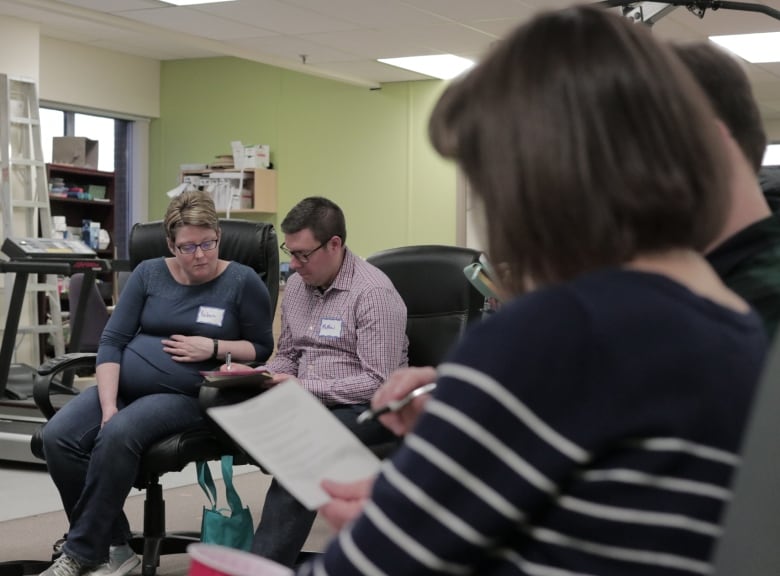Health authority anticipated blowback after cutting online prenatal classes
N.S. only province in Atlantic Canada that doesn't offer universal prenatal education

Just months into her first pregnancy, Nova Scotian cartoonist Kate Beaton learned two things: she no longer had a midwife and the province's universal prenatal program had just sputtered to an end.
Nova Scotia is the only province in Atlantic Canada that doesn't offer some form of universal prenatal education. In-person classes were officially ended in January 2015, replaced by an online course that was scrapped late last year.
"So it's kind of a ... black hole of, figure it out yourself," said Beaton in a phone interview from her home in Port Hood.
"It puts you in a difficult spot when you're looking for information ... Every day is new and every day brings something where you're like, is this normal? I don't know."
CBC News has learned the Nova Scotia Health Authority braced for blowback from parents and doctors after it pulled the plug on the Welcome to Parenting site, which provided lessons on pregnancy, birth and caring for a newborn.

Nova Scotia parents are now directed to a website with a list of links to other resources.
Documents obtained through a freedom of information request show senior staff with NSHA's Early Years program were careful about how the site's demise was communicated, noting "there was high political attention and negative media attention to discontinuing universal prenatal classes."
But the documents also detail just how few people actually registered for both in-person and online classes. The percentage of first-time moms who signed up for in-person classes dropped to 31 per cent in 2014 from 42 per cent in 2011.
Of the 1,229 users who registered for Welcome to Parenting in its second year, 90 per cent didn't click on a single lesson.
The health authority has pointed to these low numbers as the reason for discontinuing the program, and said it's now putting resources where they're needed most — with vulnerable families.
But Beaton said it's up to the province to offer prenatal resources that new parents actually want to use.
"The government had programs for expectant mothers before and then found really kind of funny excuses not to have them anymore, as in a lack of interest which there totally isn't," she said. "There's all kinds of interest, but no program."

On March 12, 2018, the Early Years manager sent an email to the Ontario company that operates Welcome to Parenting stating that NSHA was ending its contract.
Over the next several months, emails, briefing notes and memos were exchanged between NSHA staff detailing the transition, which included everything from making sure the site was no longer searchable online to distributing new print material to doctors' offices.
According to a transition plan document that was circulated by the Early Years consultant to other senior staff in April 2018, there were a number of "risks" associated with discontinuing Welcome to Parenting.
They include "negative media attention" and "loss of Public Health credibility."
"Women and families who currently use the website may see the discontinuation of the site as impacting their ability to access Nova Scotia specific prenatal information," the document states.
There's all kinds of interest, but no program.- Kate Beaton, expecting parent
NSHA expected the risk with the highest "probability" and "magnitude" would come from doctors. They made up a quarter of the referrals to Welcome to Parenting and "may perceive a gap when the website is no longer available," the transition plan stated.
An update document prepared by the Early Years manager in April 2018 also notes that doctors weren't happy when in-person classes were nixed back in 2014.
Finding information 'too much work,' says doctor
Dr. Natasha Deshwal runs Bedford Basin Women's Health Clinic and said women have been surprised and disappointed when she tells them there are no publicly funded classes anymore.
Now, instead of sending people to a resource she knows is sound, she tells people to turn to Google. She admits it's not ideal, and worries patients are getting less reliable information.

"I think people are sometimes just not even bothering to get the information just because … it's too much work," she said. "And if you are going to go online, you have to sift through to kind of figure out what's really valid and what's not valid."
In addition to searching for information online, prenatal classes are still available at private businesses that charge for the service. Family Resource Centres also offer classes with a focus on low-income parents and those in need of extra support.
In an email, a spokesperson with NSHA said it understands that, "discontinuing Welcome to Parenting may not be a popular decision with some," but that it provided a chance to end "an underused universal resource and focus specifically on women and families who need additional support to achieve better health outcomes."
The email went on to say that health care providers "are an important connect for women and families in terms of resources and supports. And so part of our plan included informing those providers of the change."
I think people are sometimes just not even bothering to get the information ...- Dr. Natasha Deshwal, Bedford Basin Women's Health Clinic
Health Minister Randy Delorey also insists this isn't about cost. Money the province spent on the Welcome to Parenting site is being distributed to other prenatal and postnatal programs, he said.
"It just really was a decision being made to direct the funding that [NSHA has] available into the programs that they've seen really provide the best value to ensure that the most vulnerable and the most mothers and new babies get the best care possible," he said.
But Deshwal doesn't think the answer is ending a universal program completely.

"I certainly do think we need to target people that we feel are most at risk," she said. "I think it's also our duty and responsibility to target everybody on the whole."
The head of Doctors Nova Scotia agrees.
"I think we have to still look at the question: how do we meet the needs of those who need prenatal education the most but still meet the needs of those who want it? And so that's going to be a larger question for the system," said Dr. Tim Holland.
N.S. trails other provinces
Prenatal education differs across Canada, but the majority of provinces — including P.E.I., Newfoundland and Labrador, Ontario, Saskatchewan, Alberta and the Yukon — offer in-person classes in certain areas.
Many of these classes are free for expecting parents, while others come at a subsidized cost.
New Brunswick and British Columbia, meanwhile, have gone the online route. New Brunswick has a free online prenatal program that's available to all new parents, and B.C. has an online prenatal registry that provides tailored information and education.
Manitoba and the Northwest Territories, like Nova Scotia, don't have in-person or online prenatal programs that are available to all expecting parents.
A spokesperson for the Health Department in Manitoba, however, said it's "exploring options to provide universal online prenatal classes."
The survey says … face-to-face
Some parents, however, are still seeking a hand-ons crash course in taking care of a newborn — and are choosing to pay for it.
At Citadel Prenatal, located on the third floor of a Halifax office building near the Windsor Street Sobeys, couples gingerly change diapers on baby dolls, caressing them close to their chests after a pretend bath.
Many of the first-time moms here asked their doctors about free prenatal classes, only to realize they aren't offered anymore.
Caity Kelly signed up for four sessions at Citadel Prenatal at a cost of over $250.
"We felt that it was worth it," said the Fall River woman. "I feel like it's important to learn the information whether there's a cost or not."
The documents obtained through the freedom of information request show the health authority conducted a survey in June 2018 with 239 parents to find out where the gaps are in prenatal education.
"Assessment of Current Prenatal Information Sources In Nova Scotia" found that nearly half — 49 per cent — of respondents want face-to-face prenatal education.
"It's community building, it's connecting with others, it's learning from trained, certified professionals that they get to ask people face-to-face questions to rather than a Google search which we all know can lead you down a rabbit hole that you don't want to go down," said Ashley Cooley, who co-founded Citadel Prenatal three years ago to fill the hole left when the universal in-person classes were cancelled.

A summary at the bottom of the 2018 survey states that the findings will help inform how the health authority plans for prenatal programming in the future. But it's unclear how that will look.
Delorey said the health authority will continue to "monitor and review" its prenatal programs and services.
For now, Beaton, who's due in May, is left to cobble together a prenatal program that works for her.
She's taking a class in hypnobirthing, which incorporates visualization and relaxation techniques. She's meeting up with other moms once a week and plans to hire a doula.
"This is a province with an aging population, and I'm always amazed by how hard they make it for young people to start families here," she said.
